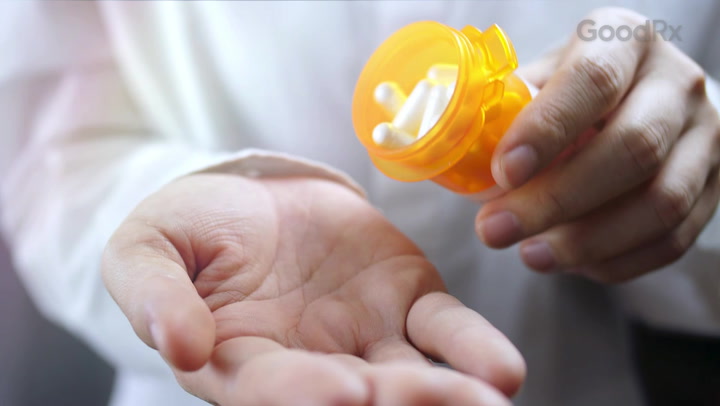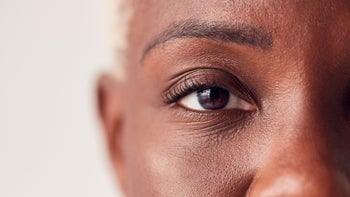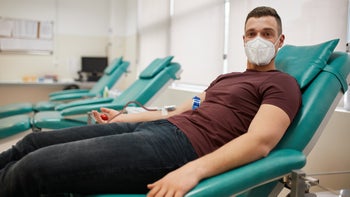
Do Prednisone and Lexapro Make You Sweat? 12 Drugs That Cause Excess Sweating
Key takeaways:
Certain medical conditions are known to make you sweat more than usual. But some prescription and over-the-counter (OTC) medications can also cause sweating as a side effect.
Examples of medications that can cause excessive sweating include prednisone (Rayos, Prednisone Intensol) and escitalopram (Lexapro). OTC pain relievers, such as ibuprofen (Motrin, Advil), are also a potential culprit.
Talk to your prescriber about your options. In some cases, they may suggest a medication change or dose adjustment to help alleviate excessive sweating.
Table of contents

If you’re sweating more than usual, there can be a few reasons why. For example, low blood glucose (sugar), a thyroid problem, or an infection could be the cause.
But it may be worth checking your current medication list, too. In fact, some antidepressants and other prescription medications can cause sweating as a side effect. An over-the-counter (OTC) product could be to blame, as well. Let’s discuss 12 medications that might make you break a sweat, and how to manage it.
1. Antidepressants
Selective serotonin reuptake inhibitors (SSRIs), such as escitalopram (Lexapro), sertraline (Zoloft), and paroxetine (Paxil), can cause excessive sweating. In fact, about 10% of people taking an SSRI report this side effect.
Search and compare options
But sweating isn’t unique to SSRIs. Other antidepressants can also make you sweat more than usual. Examples include bupropion (Wellbutrin XR, Wellbutrin SR) and venlafaxine (Effexor XR). Tricyclic antidepressants aren’t used as often, but they can cause sweating, too.
If excessive sweating starts interfering with your quality of life, talk to your prescriber. They may recommend adjusting your dosage or trying a different medication. For example, trazodone is an antidepressant that may be less likely to cause sweating.
Keep in mind that sweating from antidepressants is a possible symptom of serotonin syndrome. While rare, this is a serious condition caused by high serotonin levels in the body. If your sweating is accompanied by other symptoms, such as shaky hands or a fast heartbeat, contact your healthcare team right away. But if any symptoms feel severe or life-threatening, go to your nearest ER.
There’s a higher risk of serotonin syndrome if you’re taking multiple medications that affect serotonin levels. Your pharmacist can help you review your medication list to identify potential interactions.
2. Prednisone
Corticosteroids like prednisone (Rayos, Prednisone Intensol) are known to cause many side effects. One of these includes feeling warm and sweating more than usual.
For many people, prednisone is only taken for a short period of time. Increased sweating should go away after you complete your treatment course. But in the meantime, wearing an antiperspirant and loose, breathable clothing may help if it becomes bothersome.
Waking up in a pool of sweat? Learn more about the potential causes of night sweats, from medications to health conditions.
Looking for night-sweat relief? Here are some proven ways to lessen night sweats and stay cool at night.
What to expect: Sweating is just one prednisone side effect. Here’s what you should know about the short-term and long-term side effects of prednisone.
But some people need to take prednisone or other corticosteroids for a longer period of time. So, if sweating becomes an issue, talk to your prescriber about ways to manage this side effect.
3. Triptans
Triptans are a class of medications used to treat migraines. Examples include sumatriptan (Imitrex), rizatriptan (Maxalt), and frovatriptan (Frova).
Triptans are only taken occasionally or for a short period of time for migraine pain. But you may experience warmth, flushing, and even sweating after taking one. This should go away after the medication is out of your system, which can vary across triptans.
Similar to certain antidepressants, triptans also carry a risk of serotonin syndrome. If you’re sweating more than usual, are taking two or more medications that affect serotonin, and notice a fast beat or shaky hands, tell your healthcare team right away.
4. NSAID pain relievers
Nonsteroidal anti-inflammatory drugs (NSAIDs), such as ibuprofen (Advil, Motrin) and aspirin, can sometimes cause sweating as a side effect. This might seem surprising since they’re sometimes taken to break a fever.
Some people only take NSAIDs as needed for pain or fever. Sweating may not be a major issue in this situation. But other people take them regularly for longer periods of time, such as for osteoarthritis (OA).
If excessive sweating from regular NSAID use is affecting your daily life, talk to your healthcare team. A topical NSAID, such as diclofenac gel (Voltaren gel), may be an option if you have a condition like OA. Topical products tend to be absorbed less than oral pills, so you may not sweat as much.
5. Opioids
Opioids, such as morphine (MS Contin) and oxycodone (OxyContin), are a well-known cause of excessive sweating. This is because opioids stimulate a type of immune cell known as mast cells. Mast cells release histamine, which can result in skin warmth and sweating.
Tramadol (Qdolo, ConZip) is another opioid pain reliever that can cause sweating. Like some antidepressants, tramadol can increase serotonin in the brain. Because of this, there’s a risk of serotonin syndrome. Symptoms include sweating, shaky hands, and a fast heartbeat.
Keep in mind that opioids carry a risk of dependence. And sweating can be a withdrawal symptom after you stop taking them. Don’t stop taking an opioid abruptly on your own, especially if you’ve been taking an opioid medication for a long period of time. Your prescriber can help you discontinue it slowly and safely to avoid or minimize withdrawal symptoms.
6. Diabetes medications
If you’re experiencing sweating while taking diabetes medications, this could be a sign that your blood glucose is too low (called hypoglycemia). Other symptoms often include shakiness, fast heartbeat, and dizziness.
Hypoglycemia is the most common side effect of insulin. It’s also common with sulfonylurea medications such as glyburide (Diabeta, Glynase) and glipizide (Glucotrol XL). Hypoglycemia can happen if they’re taken alone or in combination with other diabetes medications.
Check your blood glucose levels if you notice abnormal sweating or more sweating than usual. If it’s too low, follow your healthcare team’s instructions for how to bring it up safely. Your prescriber may need to adjust your medications if this is happening regularly.
7. Certain asthma inhalers
Many asthma inhalers contain beta-agonist drugs that open up the airways. Some people experience increased sweating after inhaling these medications. They include albuterol (Ventolin) and levalbuterol (Xopenex). Some combination inhalers also contain beta-agonists, including fluticasone / salmeterol (Advair) and budesonide / formoterol (Symbicort).
Certain inhalers, such as albuterol and levalbuterol, are only used as needed. So, sweating may be less of a concern. But if you’re needing to use these inhalers frequently, you may need to add a daily inhaler to manage your symptoms.
Combination inhalers, on the other hand, are used daily. It’s not common, but they’re more likely to cause sweating than as-needed inhalers. In this case, let your prescriber know if sweating becomes a problem.
8. Proton pump inhibitors
While uncommon, sweating has been reported with medications such as omeprazole (Prilosec) and lansoprazole (Prevacid). Both medications belong to the same class: proton pump inhibitors (PPIs).
OTC versions of these PPIs should only be taken for up to 14 days at a time. Prescription versions are typically taken for up to 4 to 8 weeks. Let your healthcare team know if sweating becomes an issue. If needed, they may recommend a different acid blocker to see if that helps.
9. Viagra
Viagra (sildenafil) can commonly cause flushing. And some people also report sweating. This is because it widens blood vessels close to the surface of your skin.
Fortunately, these side effects should be temporary. They should go away when your Viagra dose leaves your body. But if they become a problem, your prescriber may lower your Viagra dosage.
10. Breast cancer medications
Certain hormone therapy medications for breast cancer, such as tamoxifen (Soltamox), can cause night sweats. Other examples include anastrozole (Arimidex), exemestane (Aromasin), and letrozole (Femara).
These medications either block or lower estrogen in your body, which can result in symptoms similar to menopause. Commonly, this can include hot flashes or night sweats.
If these symptoms are interfering with your quality of life, talk to your cancer specialist. They may recommend certain medications or other tips to help. Avoid trying an OTC menopause product without speaking to them first, since it may interfere with your treatment.
11. Leuprolide
Leuprolide (Lupron Depot, Eligard, Camcevi) is an injectable medication used to treat prostate cancer. It lowers testosterone in the body, which can commonly result in hot flashes and sweating.
You may experience these side effects when starting treatment. And for some people, they may improve over time. Talk to your cancer specialist if they get worse or become bothersome at any point. They can discuss potential treatment options with you.
12. Certain antibiotics
It isn’t common, but sweating has been reported by some people taking certain antibiotics. Examples of these include:
Ciprofloxacin (Cipro)
Moxifloxacin (Avelox)
Azithromycin (Zithromax)
In these cases, the sweating should go away after you complete your course of antibiotics. However, there are a few situations where sweating from antibiotics may be more serious, including:
Linezolid (Zyvox): This antibiotic can cause high serotonin levels in the body, potentially resulting in serotonin syndrome. This is especially the case if it’s taken with other serotonergic medications. Sweating is one symptom, along with shakiness (tremor) and a fast heartbeat.
Metronidazole: Combining the antibiotic metronidazole (Flagyl) with alcohol can result in a reaction that can cause sweating. Other symptoms include nausea and vomiting, fast breathing, and a fast heartbeat. It’s best to avoid alcohol while taking metronidazole and for at least 3 days after.
How can you stop sweating caused by antidepressants or other other medications?
Some medications listed above are only taken for short periods of time. In this case, sweating usually lasts as long as you’re taking it. Wearing loose clothing and using an antiperspirant may help provide some relief during treatment.
Other medications are taken for a longer period of time. In this case, your prescriber may suggest a few options if antiperspirants or lifestyle changes aren’t helping. These may include reducing your dosage, changing your medication, or having you stop it altogether. Don’t attempt to do this on your own without their guidance. In some cases, they may add a medication to help keep your sweating under control.
The bottom line
A wide range of medications can cause excessive sweating. Examples include antidepressants such as Lexapro (escitalopram), Zoloft (sertraline), and bupropion (Wellbutrin XL, Wellbutrin SR). Prednisone (Rayos, Prednisone Intensol), NSAIDs, and Viagra (sildenafil) can also make you sweat.
Regardless of the cause, this sweaty side effect can be quite bothersome. And staying cool may not always provide enough relief. Your best bet is to speak with your healthcare team. They can discuss adjusting your current medications or adding a new medication.
Why trust our experts?



References
AbbVie Inc. (2024). Lupron depot - leuprolide acetate [package insert].
American Cancer Society. (2023). Hormone therapy for prostate cancer.
Baidal, D. A., et al. (2016). Proton pump inhibitor–induced hyperhidrosis: Important but not recognized. AACE Clinical Case Reports.
Bryant Ranch Prepack. (2024). Prednisone - prednisone tablet [package insert].
Bryant Ranch prepack. (2024). Sildenafil - sildenafil tablet, film coated [package insert].
Carvalho, A. F., et al. (2016). The safety, tolerability and risks associated with the use of newer generation antidepressant drugs: A critical review of the literature. Psychotherapy and Psychosomatics.
Cheshire, W. P., et al. (2008). Drug-induced hyperhidrosis and hypohidrosis. Drug Safety.
Das, S. (2024). Hyperhidrosis. Merck Manual.
Hagen, M., et al. (2017). Skin penetration and tissue permeation after topical administration of diclofenac. Current Medical Research and Opinion.
International Hyperhidrosis Foundation. (n.d.). Common drugs/medications known to cause diaphoresis listed by therapeutic class.
MedlinePlus. (2022). Cancer treatment: Dealing with hot flashes and night sweats.
Nicolas, S., et al. (2024). Triptans. StatPearls.
Sheen, C. H., et al. (2008). Codeine induces human mast cell chemokine and cytokine production: Involvement of G-protein activation. Allergy.
Was this page helpful?
Related Articles
Browse medications
View AllResearch prescriptions and over-the-counter medications from A to Z, compare drug prices, and start saving.

























